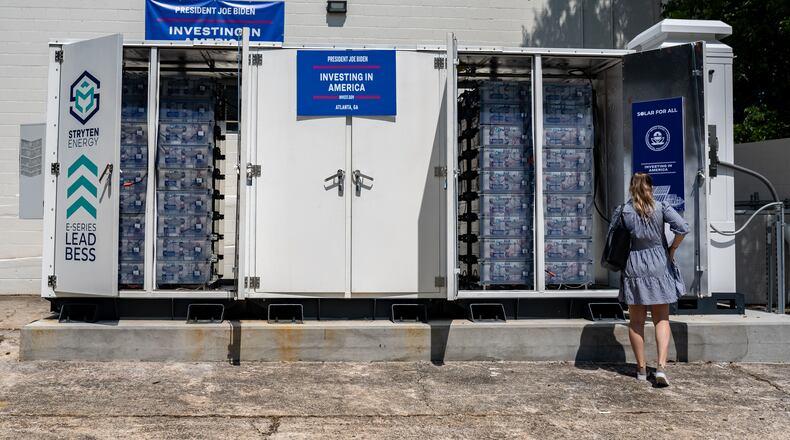Southwest Atlanta is one of the city’s communities most vulnerable to dangerous temperatures as severe weather driven by climate change increases the risk of heat-related illness and flash flooding.
The Vicars Community Center — just off Cascade Avenue near the West End — will now act as a safe haven for community members looking to escape the heat.
On Tuesday, community leaders along with Atlanta elected officials and federal partners celebrated the installation of solar energy panels with an on-site battery system capable of storing roughly three days worth of electricity.
The facility — run by Community Church Atlanta — is the first “community resilience hub” that will act as an energy resource center for its neighbors to stay cool or warm during severe weather. It can also serve as an emergency shelter in case of a power outage — to keep critical health supplies refrigerated or running.
Paid for in part by a grant through the federal Inflation Reduction Act, the new solar infrastructure on the community center will also cut the facility’s energy costs by 85%, or roughly $18,000 a year, said Kevin Earley, the senior pastor of Community Church Atlanta.
That’s money that can go to new programming or the center’s food pantry, which distributes a week’s worth of groceries to about 400 families every Wednesday.
“With the amount of mouths we feed, it’s going to be a big help,” Earley told federal officials who came to visit the center in Atlanta.
“Thanks to our solar power and battery storage, we’ll be a safety net for our neighbors during power outages and also weather related emergencies,” he said.
Credit: Ben Hendren
Credit: Ben Hendren
Atlanta Mayor Andre Dickens and U.S. Rep. Nikema Williams, along with EPA Administrator Michael S. Regan, touted the passage of the Biden-Harris administration’s Inflation Reduction Act as a catalyst for projects like the new “community resilience hub.”
The law increased funds distributed to local communities across the country to address the climate crisis and expanded eligibility for certain clean energy tax credits. Georgia alone was awarded $312 million in federal grants for solar energy initiatives.
“The city of Atlanta has long understood that this nation’s climate crisis would require urgent actions on all of our parts ,” Dickens said Tuesday, noting that the cost of converting energy systems to solar power is often out of reach for underserved communities like Southwest Atlanta.
A heat-risk study released last year identified neighborhoods within the city — including several that border the new resilience hub — as among those most at-risk to heat, based on a mix of factors including less tree cover, lack of central air conditioning, and an older, more vulnerable population.
Credit: Ben Hendren
Credit: Ben Hendren
Williams called the newest solar project in the West End a significant milestone “that puts equity at its core.”
“We’re one of the first community-owned resilience hubs — the first one in Georgia — which will develop long lasting solar energy programs for communities that are too often left behind when it comes to energy innovation,” she said. “Communities who have historically borne the brunt of pollution and climate change.”
From the front, the Vicars Community Center may not catch a second glance from passersby. But from above, a 34-kilowatt rooftop solar installation catches Atlanta’s blistering summer heat.
And sitting behind the building is a massive backup battery system — manufactured within the Peach State — which stores three days worth of energy to power the air conditioning system, a refrigerator, freezer and lighting throughout the building.
“As we continue to face the growing impacts of the climate crisis, innovative community hubs like Vicars is essential,” Regan, head of the federal environmental agency, said.
“It’s not just about safeguarding our environment and protecting the health and safety of our communities, but it’s also about investing in resilient, sustainable, clean energy,” he said.
Credit: Ben Hendren
Credit: Ben Hendren
About the Author
Keep Reading
The Latest
Featured






